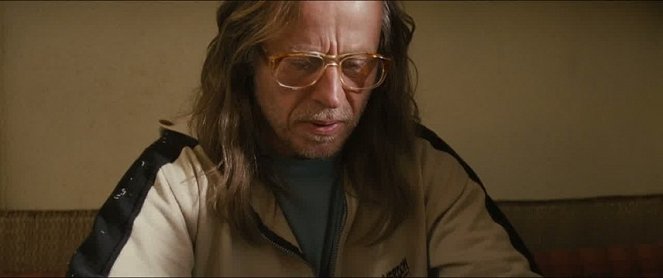Regie:
Bohdan SlámaDrehbuch:
Bohdan SlámaKamera:
Diviš MarekMusik:
Vypsaná fiXaBesetzung:
Jaroslav Plesl, Aňa Geislerová, Marek Šácha, Anička Bubeníková, Karel Roden, Klára Melíšková, Igor Chmela, Jiří Mádl, Miroslav Sabadin (mehr)Inhalte(1)
Fogi is a weirdo, who’s enjoying his never ending puberty. But simultaneously, Fogi is also trying to live up to his family duties and bring up Véna, his son from the first marriage. He didn’t get married again but lives with Jana, a post office employee. Together they have little Anicka and they all live in a flat in a small town. At first, Jana is trying to tolerate Fogi’s moods, but her patience is running out. Fogi loses his job. On top of that he starts to see himself in his adolescent son and realizes with horror that Véna repeats his own mistakes. The first fights, bans and mutual misunderstandings are approaching... (Verleiher-Text)
(mehr)Videos (6)
Kritiken (5)
Die glückssuchenden Charaktere wird dies bei Sláma nicht mehr überraschend, ebenso wie der Hauch an existenzieller sozialer Romantik (Armut ist seines Erachtens nach kein soziales Stigma, weder im positiven noch im negativen Sinne - es ist ein eher ein produktiver Seinszustand, der zum Suchen anregt). Für tschechische Bedingungen überrascht die Spiritualität - außer alkoholischen Getränken sowie lauen Revolten suchen hier die Charaktere nach einem Ausweg in "etwas, was uns übersteigt" - und Sláma ist es gelungen, sowohl die Essenz des tschechischen "Irgendwasismus" als auch die zeitgenössische Fixierung aufs New-Age-Fetisch wie die Rückkehr zur Mutter Erde abzubilden. Die spirituelle Pilgerreise zum Meister stellt einen Wendepunkt dar, einen Ort, an welchem die gegenwärtige Bedeutungslosigkeit zur Bedeutung selbst avanciert (wer kann sich den schließlich der naiven Vorstellung entziehen, ob der vulgäre Gärtner nicht doch ein mystischer Meister ist ...). Vier Sonnen scheinen mit dem Moment unerfüllten Glaubens, gefolgt von einer barmherzigen Lüge. Dies ist ein starker Moment, der erleichternd und deprimierend zugleich ist. Mit Ausnahme kleinerer Inszenierungsmängel kommen hier jedoch sämtliche bearbeiteten Themen zum Vorschein. Sláma hat die Gabe eines Beobachters, und das Klischee über Kiffer verwandelt sich in seiner Präsentation zu einem authentischen Erlebnis (der Dialog auf den Toiletten ist meisterhaft zusammengestellt und strahlt eine große innere Spannung aus). Hervorzuheben ist auch die Art und Weise, wie der Regisseur vertraute Gesichter "verbogen“ hat, so dass sie in den Rollen von Freaks oder Verlorener natürlich agieren. Vorwürfe? Ich verstehe die therapeutische Wirkung der Filmendes, jedoch die Katharsis erlebt da eher der Regisseur selbst. Außerdem kling das "himmlische Festmahl" nach den exzellent und intuitiv exakten Szenen sehr krampfhaft aus. Und noch eine Bemerkung: Es wird mich in der Tat sehr freuen, wenn ein tschechischer Filmemacher in der Lage sein wird zu tun, was beispielsweise türkische Filme schaffen - einen Charakter den elementaren Kräften auszusetzen, ohne sich den sprichwörtlichen Sprinkler über deren Köpfen vorzustellen. Ansonsten hervorragend.
()
Bohdan Sláma is one of the few contemporary Czech directors who, in my opinion, has something to say to his audience. The problem is that he doesn't always choose adequate means and quite often comes up with rather lifeless constructs instead of real burning stories from life. In the case of Four Suns, after just a few minutes, I felt like Sláma was speaking a different language than the one I understood. I really didn't get this film. After 33 minutes of suffering, I gave up and, of course, in that case, I also gave up on rating it with stars. However, if I managed to endure until the end, the star allocation would truly be modest. Probably extremely modest. In one scene, Karel Roden asks the people present why they're here, and what they're doing, and I kept asking myself the whole time why I was watching it when there are thousands of more sensible ways to spend my free time...
()
Unfortunately, the best thing about this movie is the title song from the band Vypsaná Fixa, which is really completely divine and fits this film and its melancholy perfectly. Other than that, I didn’t understand a lot of people in this relationship drama, Anna Geislerová the least of all. I wonder if she herself understood the behavior of her character, because if she did, she defended her acting arguments perfectly. Similarly, I didn’t quite understand the character of Karel Roden, who, as usual, plays a character named Karel and is once again a jerk. The last surprise is Jirka Mádl, who has a Mohawk on his head and is a tough punker. Too bad there’s no more to see in this film. In retrospect, I realize that there are a lot of weird people in the film who are all fucked, and that’s the end of it.
()
Bohdan Sláma certainly doesn't belong to those creators that I would actively seek out. His characters are often quite similar, but well, he simply focuses on a certain group of people and is drawn to the countryside or small town. For example, I liked "The Country Teacher," whereas "Four Suns" is a very empty statement about how some people have a pretty shitty life, but they will continue living it because they don't know any other way.
()
Once again, Sláma was able to make me want to kill myself right at the beginning of the screening. Luckily, Aňa Geislerová came on the scene after that, and despite all the issues she was there throughout the rest of the film. That's all that happened. So why should I even waste my time analyzing this? The final piece of wisdom, i.e., "I'm going to take a piss." speaks for itself. The trio of Melíšková, Chmela, and Plodková also didn't work any miracles. In the end, perhaps I could add that a debate on the topic of the educated and uneducated viewer would be interesting, or not.
()



Werbung